#spring 2024 logo
Text
youtube
Get ready to join me in an exciting livestream where we'll delve into the impact of quarter-life crisis on my next album's creation. We'll be focusing on themes of existential angst that many of us can relate to. This is going to be a thought-provoking and engaging 2-part discussion that you won't want to miss.
#soundcloud#spotify#music#nctrnmfm#nctrnm#nowplaying#beats#audio#chill#np#live#streaming#now streaming#lp4#nctrnmlp4#spring 2024 logo#Youtube
3 notes
·
View notes
Text

Chanel s/s 2024
#chanel#runway#model#beach#paris fashion week#fashion week#pfw#swimwear#swimsuit#chanel logo#jewelry#pearls#choker#stripes#detail#virginie viard#spring 2024
4 notes
·
View notes
Text

0 notes
Text
A hunter ventures to the woods to add to his trophy collection. After another successful hunt, he encounters a rare fawn. Little does he know he’s not the only one who’s found a new trophy.

⭐️COME JOIN THE HUNT IN SPRING 2024🦌
Logo Design by dashenvy (Instagram) & @casukaga
40 notes
·
View notes
Text
don't you worry, there's still time | chef luca x fem!reader | sneak preview #2: playlist & banner
this oneshot is getting closer and closer to living out in the real world with every single day, so i thought i'd drop another sneak preview: the playlist, a moodboard-like banner, AND.... drum roll please... OUR GIRL'S RESTAURANT LOGO made by the wonderful @translatemunson.
this fic will pick up in the spring of 2024, almost a year to when luca and chef met. we will see them navigate their increasingly growing relationship while marcus learns how to mend a broken heart.

(more underneath the cut)

#Spotify#chef luca#will poulter#luca the bear#the bear season 2#the bear headcanon#luca x reader#the bear hulu#the bear fx#the bear fanfiction#chef luca x reader#pastry chef luca#burn your life down#dont your worry theres still time
96 notes
·
View notes
Text

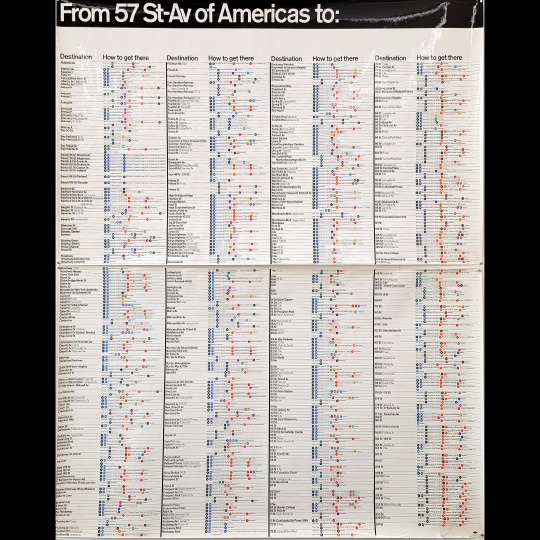





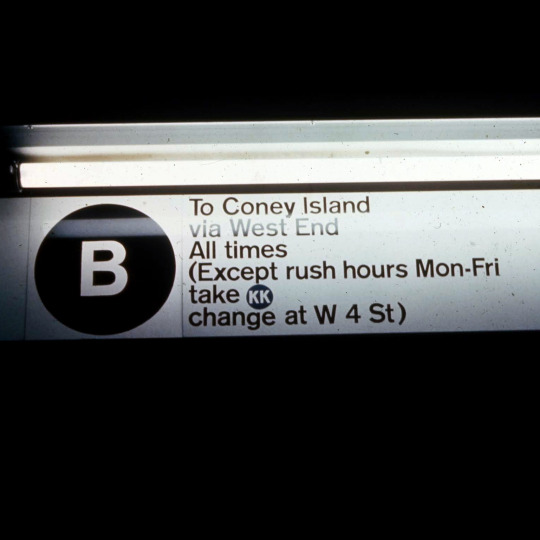

Please join us for our next Open Houses! March 20-21, 2024 10am-4pm.
The NYC subway map that never was. Or at least it was never implemented.
The NYC Subway graphics are some of the most requested artifacts from the Vignelli archives. We acquired this unique “verbal map” aka “The Directory” aka the “How to get there” map in 2022. Our archivist put it on display for the first time in 50 years at our Open Houses in September 2022!
“The Verbal Map described how to reach a destination, which train to get, where to change, and when to get out.” – Massimo Vignelli [comment on Michael Bierut’s essay “Mr. Vignelli Map” for Design Observer]
Printed on very glossy paper in full color, this map is large like the station size maps. Printed in two parts [top and bottom] each half measuring 29.5” x 47.5”.
In the Graphic Standards Manual on Page 3 “Diagram of Basic Sign Distribution” it describes the various maps to be installed:
Maps: System maps (implemented, the famous one),
neighborhood map (not implemented),
‘How to get there’ map (not implemented but we have the prototype!)
From the Graphics Standards Manual on page 75, “The Directory”:
“The directory is designed to help a passenger find his “Destination” and “How to get there” quickly and easily. Each station will have its own directory listing all other station alphabetically and numerically. Each station will be followed by the color disc designating he trains that stop there. If there is no direct train, transfer information will follow the station name. This directory will be placed at all important points in the subways station both inside and outside the turnstiles.”
We also have the Dekalb Av Signage Study “analyzed and completed by Joan Charysyn and Virginia Macintosh” for Unimark International in 1971 which shows a mockup of the various maps and states “A directory and three maps will eventually be in use in all subway stations.”
Be sure to join us for our next Open Houses and see what other surprises you can discover! Learn more opn our events page: https://www.rit.edu/events/vignelli-center-spring-open-house
Image descriptions:
Detail of “verbal map” aka “The Directory” aka the “How to get there” map
image of entire map
Video clip of map
Photo of Open Houses with logo
vintage 35mm slide of detail of “verbal map”
NYCTA Graphics Standards Manual pg. 75 “The Directory”
NYCTA Graphics Standards Manual pg. 75 “The Directory”
Slideshow of Dekalb St study: coversheet, Directory from Grand Central, System Map, Neighborhood map, and 5 Boroughs map
Vintage 35mm slide of 57th Street station signage
Vintage 35mm slides of 57th Street station signage
20 notes
·
View notes
Text
DEV LOG: February 2024
One of our goals for the year is to post more regular dev updates, but we're still working out a comfortable format for these so please bear with us heh! 😅
TROUBLE COMES TWICE: BONUS STORIES
Testing Bonus Stories has mostly been about tweaking the script and fixing silly sprite mistakes. (Also, Cam and Adrian hanging out alone at the park? What could they be talking about? 🤔)

We jumped the gun and said probably February for the release (obviously, that didn't happen). We're very confident about releasing the DLC this month though, so keep an eye out for a release date in the coming week! 💜
BURN THE MIDNIGHT OIL
We've been focused on Bonus Stories, but there's a lot happening behind-the-scenes on our new project thanks to our amazing art team.
SPRITES

Lydia's just wrapped up the first sprites for the eight main characters (including protagonists Circe and Dante)! We're now working on the expressions and minor pose changes for these before moving onto the side characters needed for the upcoming demo.
UI
We spent February experimenting with logo drafts! Toby had so many good ideas, it was tough to decide on just one.
Though we're going to keep the finished logo a secret until we're ready to announce, we figured it couldn't hurt to show a quick look at some of the icon ideas. 😉

BACKGROUNDS
Just last month, we welcomed the incredibly talented Damien to the team. He's already worked through about half of the BGs we need for the demo and we're extremely excited to see them in-game! 🌙

It's hard to wait and not just show off everything right away when we're so excited about the future of this project!! Hopefully sometime this spring, we can make a proper announcement and reveal more. ✨
GOALS FOR MARCH
Release Trouble Comes Twice: Bonus Stories! 🌞
Continue work on Burn the Midnight Oil 😈
#monthly update#visual novel#trouble comes twice#burn the midnight oil#trouble comes twice: bonus stories
32 notes
·
View notes
Text
GJ and ZZH Updates — February 25-March 2
previous week || all posts || following week
This is part of a weekly series collecting updates from and relating to Gong Jun and Zhang Zhehan.
This post is not wholly comprehensive and is intended as an overview, links provided lead to further details. Dates are in accordance with China Standard Time, the organization is chronological. My own biases on some things are reflected here. Anything I include that is not concretely known is indicated as such, and you’re welcome to do your own research and draw your own conclusions as you see fit. Please let me know if you have any questions, comments, concerns, or additions. :)
[Glossary of names and terms]
[Masterlist of my posts about the situation with Zhang Zhehan]
02-25
→ Rare posted a photo ad featuring Gong Jun. (1129 kadian)
→ The Instagram posted a video from the latest scam concert.
02-26
→ BEAST posted a teaser video featuring Gong Jun. (1129 kadian)
→ The Instagram posted another of the same.
02-27
→ BEAST posted another teaser video (1129 kadian) and a photo ad featuring Gong Jun.
→ The Instagram posted three photos of "Zhang Zhehan" and "Zhang Mama" and seven of an aquarium. The previous Zhang Mama impersonator has visibly been replaced by a new one, likely due to the previous one being in declining health.
→ PRSR posted a photo ad featuring Gong Jun.
02-28
→ Tissot posted a promotional video spoken by Gong Jun.
→ Gong Jun posted a commercial he did for BEAST. (10:42, 511 kadian possible if you push it) Caption: "Spring is coming, and the God of Flowers is about to wake up… I hope you can meet the golden finger and find the black vanilla"
→ BEAST posted a photo ad featuring Gong Jun. (1129 kadian)
→ Gong Jun's studio posted a behind the scenes video from the BEAST shoot. Caption: "The subtle fragrance stays and lingers for a long time. Meet @ Gong Jun Simon in the early spring~"
→ Xiao Chu (aka Nada), who moved to Canada at the end of last year, changed her LinkedIn profile to credit herself as the sole writer for Word of Honor, despite it being an adaptation and despite Xiao Chu herself admitting back in 2021 that it was a collaborative effort. There has also been speculation that her husband may have been involved in the writing, as his name is the one in the contract. Xiao Chu has openly been involved with the Zhang Sanjian scam, and has recently been hiring ghost writers.
02-29
→ Nothing of note.
03-01
Addition 03-06: Gong Jun's studio posted a douyin with footage from the BEAST shoot. BGM is 偷心 by Jacky Cheung.
→ 361° posted a teaser commercial featuring Gong Jun. (1129 kadian)
Fan Observation: The logo at the end of the video, which is used for Gong Jun's line with 361°, has what appears to be oranges added.
→ The makeup brand Za posted a photo ad teasing an upcoming endorsement with Gong Jun. (1129 kadian)
→ Gong Jun's studio posted fourteen photos from the BEAST shoot. Caption: "Spring returns to all things, @ Gong Jun Simon's warm fragrance awakens the radiant poetry."

→ The Instagram posted ten photos of the new fake Zhang Mama.
03-02
→ Za posted another photo ad teaser. (1129 kadian)
Additional Reading:
→ Late addition to last week: The cram school that included slander against Zhang Zhehan in their test prep books after 813 are facing scam claims and resulting refund requests of 40 million RMB.
→ [Here] (shirtless Sanjian warning) is a really good comparison showing how much photoshopping is being done to the photos posted on the Instagram, and [here] is one showing the height difference between two different Zhang Sanjians.
previous week || all posts || following week
This post was last edited 2024-03-06.
16 notes
·
View notes
Text
Tomorrow X Together Announce 2024 U.S. Tour

Act: Promise will span 11 shows across eight cities including New York, Los Angeles, Houston, and Washington
K-pop band Tomorrow X Together announced on Tuesday that they’ll be embarking on the U.S. leg of their Act: Promise tour this spring.
The trek, which launches in South Korea’s capital, Seoul, on May 3, promises to be “grander” than its 2023 predecessor Act: Sweet Mirage. The U.S. portion of their world tour kicks off May 14 in Tacoma, Washington, and features 11 total shows across eight cities including Oakland, Los Angeles, Houston, and New York.
According to a press release, Act: Promise “embodies the commitment to move forward together towards a hopeful future.” The concert is billed as an example of a “cohesive narrative, seamlessly weaving together captivating music, performances, VCRs, and set designs.”
Tickets for the tour will go on sale to the general public on March 24 via Ticketmaster.
Earlier this month, the quintet — Yeonjun, Soobin, Beomgyu, Taehyun, and HueningKai — announced their upcoming sixth mini album, Minisode 3: Tomorrow, due April 1, while also unveiling a new logo and color scheme for their upcoming era. The group previously dropped Minisode 1, featuring their massive hit “Blue Hour,” in 2020. Minisode 2, which included “Good Boy Gone Bad,” released in 2022.
Last summer, Tomorrow X Together performed at Lollapalooza in Chicago, stacking their set list with tracks like “Farewell, Neverland,” “Lonely Boy,” and “Anti-Romantic.” The group invited Coi Leray onstage for a surprise cameo during “Happy Fools,” sealing their set as one of the most memorable of the fest.
Tomorrow X Together 2024 U.S. Tour Dates
May 14 – Tacoma, WA @ Tacoma Dome
May, 18 – Oakland, CA @ Oakland-Alameda County Coliseum
May, 21 – Los Angeles, CA @ Crypto.com Arena
May, 22 – Los Angeles, CA @ Crypto.com Arena
May, 26 – Houston, TX @ Minute Maid Park
May, 29 – Atlanta, GA @ State Farm Arena
June, 1 – New York, NY @ Madison Square Garden
June, 2 – New York, NY @ Madison Square Garden
June, 5 – Rosemont, IL @ Allstate Arena
June, 6 – Rosemont, IL @ Allstate Arena
June, 8 – Washington, DC @ Capitol One Arena
#txt#tomorrow x together#240320#article#rolling stone#soobin#yeonjun#beomgyu#taehyun#hueningkai#act: promise#txt world tour
14 notes
·
View notes
Text
So one fun thing you’re able to do is check the archives of newish Tumblr users and pinpoint a specific Twitter Event that caused them to join. For your convenience, I've compiled a timeline of notable Twitter Events.
2022
Elon plans to buy Twitter
- April 4: Musk formally discloses a 9.2% stake in Twitter
- April 14: Musk offers to buy Twitter for $44 billion
- April 25: Twitter accepts the offer
- July 8: Musk withdraws offer citing issues with spam bots
- July 12: Twitter sues Musk to enforce the deal
- July 29: Musk countersues
- October 4: Musk revives the original deal to avoid a trial
- October 26: Musk carries a bathroom sink into Twitter HQ
- October 27: The acquisition is complete & Twitter goes private

Mass layoffs and resignations
- October 27: Musk fires several key Twitter executives
- November 4: Twitter lays off half of its employees
- November 4: Twitter decimates its communications department
- November 10: Security, privacy, & compliance leaders resign
- November 15: Musk fires employees who criticized him on Slack
- November 17: Hundreds of Twitter’s remaining staff resign
- February 2023: Twitter lays off 10% of its remaining employees

Twitter banlist updates
- November 18: Andrew Tate and Jordan Peterson unban
- November 19: Donald Trump unban
- November 20: Kanye West unban
- November 21: Marjorie Taylor Greene unban
- November 24: General amnesty for past banned accounts

Blue check mark arc
- October 30: Musk announces monthly verification subscription
- November 9: Twitter launches verification subscription
- November 11: Twitter suspends verification subscription
- December 12: Twitter relaunches verification subscription
- December 12: Twitter announces removal of legacy verification
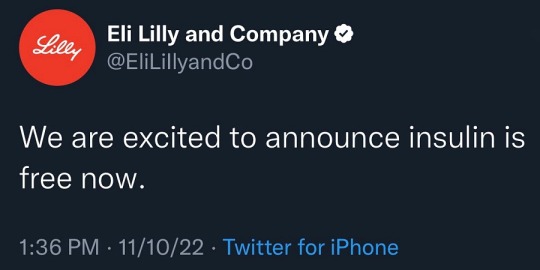
2023
Blue check mark arc (continued)
- March 23: All accounts must pay for verification starting April 1
- Late March: Celebrities and organizations refuse to pay
- April 11: 4/20 is the final date for removing legacy verification
- April 20: Musk reveals he pays for certain people’s verification
- April 22: W/o legacy, verified becomes status symbol for losers
- April 23: Accounts with 1+ mil followers receive free verification
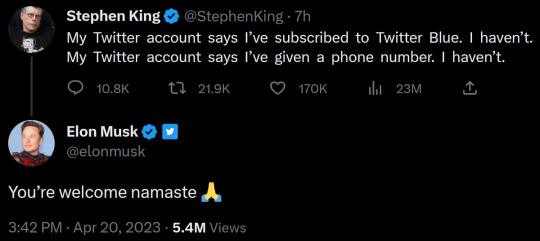

Spring cleaning
- May 8: Twitter plans to remove accounts inactive for 30+ days
- May 11: Musk announces he's stepping down as Twitter CEO
- June 1: Ella Irwin, head of trust and safety, resigns
- June 4: Linda Yaccarino becomes Twitter's new CEO

Summertime madness
- June 30: Twitter requires users log in to see tweets/profiles
- July 1: Twitter limits the number of daily tweets users can read
- July 5: Users are now able to see tweets without logging in
- July 23: Twitter rebrands to X
- July 26: Brands must buy ads or lose X verification
- July 28: X opens ad revenue sharing for verified creators globally
- August 2: X Blue users can now hide their check marks
- August 18: Musk says "Block is going to be deleted as a 'feature'"
- Sep. 2: X will limit poll voting to verified users
- Sep. 4: Musk threatens to sue ADL for alleged ad revenue loss

Fall
- Oct. 9: X Blue users can limit replies to verified accounts
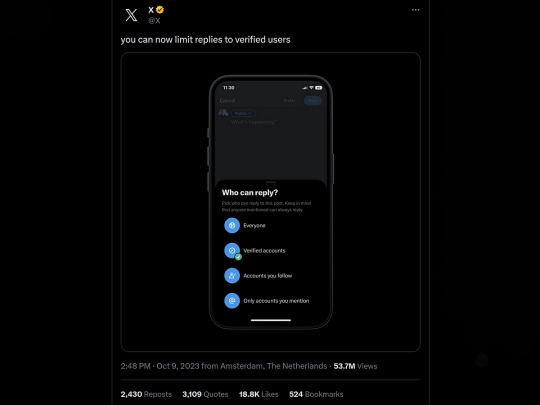
Winter
- Nov 29: Elon Musk tells advertisers: ‘Go fuck yourself’

Miscellaneous Events (mostly Twitter)
- January 10: Musk’s net worth dropped $182 billion in 2022
- January 10: Algorithmic “For You” page is now the default
- January 24: Users can now set chronologic timeline as default
- February 1: Twitter moves to discontinue free access to API
- March 26: Twitter reports parts of its source code leaked
- March 27: “For You” page will only show verified accounts
- March 27: Only verified accounts will be able to vote in polls
- March 29: Twitter introduces three tier system for API access
- April 3: Musk changes Twitter logo to Doge
- April 20: SpaceX Starship launch concludes with explosive finish
- May 12: Tesla recalls 1.1 mil cars in China citing safety concerns

2024
TBD
ye
#twitter#tumblr#this is also true for returning users#rambles#normal daytime posts#oh heck yeah#anyway happy one year since Twitter said yes#long post
69 notes
·
View notes
Text

20231003 Miu Miu Spring Summer 2024 Fashion Show (Momo)
© China Momo Bar | Do not edit or crop the logo.
12 notes
·
View notes
Text
Since 2018, conservative state legislatures across the country have proposed and passed laws targeting young transgender people’s freedom to to play on sports teams and use bathrooms that correspond with their gender, and to obtain gender-affirming health care. Advocates for trans rights argue that the increased interest in the subject has served to galvanize the energies of those who had fought an ultimately losing battle against gay marriage—and have observed how the anti-trans movement has used tactics that have proved successful in limiting abortion. As with much legislation of this type, amid the nationalized, culture-war politics, the effects are felt most acutely by the most vulnerable families and individuals.
In a startling piece of reporting in this week’s issue, Emily Witt follows a mother named Kristen Chapman who moves her family from Tennessee to Virginia, in order for her daughter Willow to continue receiving gender-affirming care. “I genuinely feel we are being run out of town on a rail,” Chapman says. “I am not being dramatic. It is not my imagination.” With nuance and compassionate precision, Witt captures the urgency of the family’s relocation, and the sense, as laws seem to change underfoot, of pursuit. As she writes, “Chapman had chosen Virginia for their new life, she said, because it was still in the South, but there would be ‘multiple avenues of escape.’ ”
On the last morning of July, Kristen Chapman was getting ready to leave Nashville. Chapman, who is in her early fifties and wears her silver hair short, sat on a camp chair next to a fire pit outside the rental duplex where her family had lived for twelve years. She was smoking an American Spirit and swatting at the mosquitoes that kept emerging from the dense green brush behind her. Her husband, Paul, who was wearing a T-shirt with the Guinness logo, carried boxes out to the front lawn. Their daughters, Saoirse and Willow, who were seventeen and fifteen, were inside, still asleep. Chapman looked down at the family’s beagle mix, Obi-Wan Kenobi, who was drinking rainwater out of a plastic bucket. “We got him when we moved in here for the kids,” she said. “He’s never lived anywhere else.”
Paul was planning to stay in town; Chapman was heading to Richmond, Virginia, with Saoirse and Willow. Chapman and Paul’s marriage was ending, but the decision to split their family apart had happened abruptly. Willow is trans, and had been on puberty blockers since 2021. In March, Tennessee’s governor, Bill Lee, had signed a bill that banned gender-transition treatment for minors across the state.
On paper, the law, which went into effect in early July, would allow trans teens like Willow to continue their medical care until March of 2024. But Chapman wasn’t sure they could count on that. Willow was determined to begin taking estrogen when she turned sixteen, in December of 2023, which would allow her to grow into adulthood with feminine characteristics. If she couldn’t continue taking puberty blockers until then, she would begin to go through male puberty, which could mean more surgeries and other procedures later in life.
At first, the family had hoped that the courts would declare the new law unconstitutional. Federal courts had already done so in at least four other states in 2023, finding that such bans violated the First Amendment and the equal-protection and due-process clauses of the Fourteenth Amendment. But that spring the Pediatric Transgender Clinic at Vanderbilt University Medical Center, where Willow had been receiving care, informed its patients that it was ceasing operations. Seeing this as a bad sign, Chapman set up a GoFundMe page in early May and began planning their departure.
Inside, the apartment was filled with abandoned objects—an old Wi-Fi router, trash bags of unwanted clothes. A Homer Simpson doll in a hula skirt lay forgotten on a windowsill. Chapman, an artist who supplements her income with social work, had recently quit her job as a caseworker. She would need their landlord as a reference to get an apartment, especially because she had bad credit, but the family still owed him back rent. She checked Venmo, waiting on a loan from a friend.
At six-thirty that morning, Chapman had gone out to her white Dodge S.U.V. and found her younger daughter asleep in the back seat. Willow had gone over to a friend’s house and stayed out late. When she got home, she realized that she had locked herself out. The Dodge’s window had been stuck open for months, so she got in. “Any other human being would have handled this totally differently,” Chapman said, shaking her head.
Willow had gone back to sleep in her room, which she once shared with her brother. (He was a sophomore in college and had already moved out.) The colorful scarves and lights that used to decorate the space had been taken down. When she woke up, she began sifting through what was left. “I feel like I’m ready to say goodbye to it,” she said, looking around. There were drawings scrawled on the wall, a desk spattered in paint. “Most of the stuff in here I’ve trashed.”
“It’s like getting a new haircut,” Chapman said. “A fresh palette.”
Chapman had chosen Virginia for their new life, she said, because it was still in the South, but there would be “multiple avenues of escape.” Paul worked nights for a large grocery-store chain; Richmond was among the northernmost cities where it had branches, and Chapman thought that at some point he might be able to transfer there. Earlier in the summer, she and Willow had driven to Richmond to see the city, and Chapman had lined up a marketing job. It didn’t pay well, but she knew she wouldn’t get a lease without a job. Willow, who had received her last puberty-blocker shot at the Vanderbilt clinic in late May, was supposed to receive her next one in late August. They didn’t have a lot of time.
Despite having taken puberty blockers for two years, Willow looks her age. She is tall and long-limbed and meticulous about her appearance. That morning, she had on Y2K-revival clothes: wide-legged jeans worn low on the hips with a belt, a patterned tank top, and furry pink Juicy Couture boots. Her blond hair was glossy and straight, her bangs held back with a barrette. She is committed to living her adolescence as a girl regardless of what medical treatment she is allowed to receive. At times she has used silicone prosthetic breasts; attaching them is an onerous process involving spray-on adhesive.
From a very young age, Willow wore dresses and gravitated toward friendships with girls. Her parents thought that she would likely grow up to be a gay man. As Chapman put it, “We knew she was in the fam.” When a homophobic shooter killed forty-nine people at Pulse, the gay night club in Orlando, in 2016, Willow, who was eight at the time, accompanied her mother to a vigil in Nashville. Willow wrote a long message on a banner in solidarity with the survivors. Chapman took a photo of her there. “It was like she was transfixed,” Chapman remembered. In the sixth grade, Willow went to an all-girl sleepover. A parent overheard the kids discussing gender and sexuality, and told Chapman. Willow says that it was around then that she began to think about her identity. “Pretty much as soon as I knew about, like, conceptualized gender, I knew I wanted to be a girl,” she said. She had been an A student, but her grades started going down. Looking back, Willow struggled to articulate what had happened. “It just got complicated, like with all my stuff physically, it just felt like a mess,” she said.
She came out to her friends first; then one day, in the spring of 2020, while she was upstairs on her laptop and Chapman was downstairs working, Willow sent her mother a three-word e-mail that said, “I am trans.” Willow told me, “I realized I have to do this sometime if I want to advocate for myself and get what I need to get.” She left it to her mother to inform the rest of the family. Chapman was accepting; Paul was more skeptical. “That’s him, you know—a man of science,” Chapman said. “It wasn’t overly positive or negative.”
Willow had already decided on her new name before coming out, and began using it with friends. She was again reluctant to tell her family. “I was, like, I’ll keep that secret,” she said—she had been named at birth for a brother of her father’s who had died, and knew the name was important to him. Her mother found out when another mom referred to Willow by her chosen name. Chapman started using it right away; it took Paul another year.
To figure out their next steps, Chapman took Willow, who was then twelve, to her regular pediatrician at Vanderbilt University Medical Center. She was referred to the center’s Pediatric Transgender Clinic. The clinic, which opened in 2018, was part of a broader expansion of gender-affirming care at flagship medical schools in the South that occurred around that time. (Clinics also opened at Duke University, the University of Mississippi, and Emory University, among other schools.) These places “attracted the kind of people who build very trusting relationships with patients and are able to establish not just the clinical competencies but also an inclusive environment,” Jasmine Beach-Ferrara, the executive director of the Campaign for Southern Equality, an advocacy group for L.G.B.T.Q. rights, told me. “All those things are nothing you can take for granted when seeking medical care in the South.” (Federal funding for health care is often funnelled through state governments, some of which have a history of withholding money from providers that offer abortion and other politicized health services.)
Care for patients who are experiencing gender dysphoria is highly individualized: some trans kids opt for a purely social transition, changing their names or pronouns; others, like Willow, seek a medical transition, which can be started at the onset of puberty. In Willow’s case, a diagnosis of gender dysphoria had to be verified before pharmaceutical treatment could begin. A course of psychotherapy was accompanied by a physical assessment at Vanderbilt, which included ultrasounds, X-rays, and blood tests. The clinic was following a protocol supported by the Endocrine Society and the World Professional Association for Transgender Health, whereby patients take puberty blockers—which have been used to treat children experiencing early-onset puberty since the nineteen-eighties—to delay the onset of secondary sex characteristics until they are ready to begin taking estrogen or testosterone.
“I’d always explain it to the families as a pause on puberty, allowing the youth to take a deep breath,” Kimberly Herrmann, a pediatrician and internist at Whitman-Walker Health, a provider in the Washington, D.C., area that offers gender-affirming care to patients aged thirteen and over, told me. (Some patients choose to go through their natal puberty.) “All of the data suggests that it is the correct thing to do for a patient with a clear diagnosis,” Izzy Lowell, a doctor who started a telehealth practice for gender-affirming care called QueerMed, said, of taking puberty blockers. “If they are going to develop the body of a grown man, it becomes difficult to undo those changes.”
Paul was worried about the blockers’ long-term effects on Willow’s health. (Studies have shown that they can affect bone density when used long term, and the protocol for hormone therapy advises doctors to discuss potential risks to fertility and options for fertility preservation.) Chapman thought the risks to Willow’s well-being would be worse if she developed male secondary sex characteristics. In one testimony against the Tennessee ban, an adult trans woman described her adolescence, in which she attempted to present as male, as “a disastrous and torturous experience.”
“Paul and I talked about it and came to the belief that we wanted her on them as quickly as possible for safety reasons,” Chapman said. “I hate that that’s true, but we know that’s the world that we live in, and that she is going to be a safer person for the rest of her life if she does not look male.” (A recent analysis of crime statistics from 2017 and 2018 found that transgender people are more than four times as likely as cisgender people to be the victims of a violent crime.)
The evaluation and diagnosis took almost a year. For Willow, the talk therapy was the most taxing part. Willow was insured through the state’s Medicaid program, TennCare, which meant that there were only a limited number of therapists she could see, none of whom were trans, or even queer. She went through three in a year. “We were in the lowest tier of care,” Chapman said, adding that at least one therapist dropped their health insurance. Willow told her mother that she wished she could just be left alone to be a “sad trans girl.”
At the age of thirteen, she was finally able to start puberty blockers. “You have an end goal,” Willow said of the experience. “And all the in-between doesn’t matter.”
In September, 2022, the conservative commentator and anti-trans activist Matt Walsh, who moved to Nashville in 2020 (along with his employer, the conservative news company the Daily Wire), posted a thread on Twitter. “Vanderbilt drugs, chemically castrates, and performs double mastectomies on minors,” it began. “But it gets worse.” Walsh—who is the author of books including “Church of Cowards: A Wake-Up Call to Complacent Christians” and “What Is a Woman?,” a polemic arguing that gender roles are biologically determined—worked in conservative talk radio before being hired by the Daily Wire as a writer, in 2017. Last year, the left-wing watchdog group Media Matters for America mapped Walsh’s origins as an aspiring radio shock jock in the early twenty-tens who once said, “We probably lost our republic after Reconstruction.” In 2022, he was one of several right-wing social-media pundits who began broadcasting misinformation about hospitals that provided gender-transition treatment for minors, which were then overwhelmed with phone and e-mail threats and online harassment. One study found that more than fifteen hospitals modified or took down Web sites about pediatric gender care after being named in these campaigns.
Walsh included in his thread about Vanderbilt a video clip of Shayne Taylor, the medical director of its Transgender Clinic, speaking of top and bottom surgeries as a potential “money-maker” for the hospital. Walsh did not specify that Taylor was mostly speaking about adults. (Vanderbilt never performed genital surgery on underage patients and did an average of five top surgeries a year on minors, with a minimum age of sixteen.) More than sixty Republican state legislators signed a letter to Vanderbilt describing the clinic’s practices “as nothing less than abuse.” In a statement calling for an investigation, Governor Lee, who was up for reëlection, said that “we should not allow permanent, life-altering decisions that hurt children.” Within days, Vanderbilt announced that it would put a pause on surgeries for minors. Jonathan Skrmetti, Tennessee’s Republican attorney general, began an inquiry into whether Vanderbilt had manipulated billing codes to avoid limitations on insurance coverage.
In October, Walsh and other anti-trans advocates held a “Rally to End Child Mutilation” in Nashville’s War Memorial Plaza. The speakers included the Tennessee senator Marsha Blackburn, the former Democratic Presidential candidate Tulsi Gabbard, and Chloe Cole, a nineteen-year-old self-described “former trans kid.” After identifying as male from the age of twelve, receiving testosterone, and getting top surgery, Cole de-transitioned to female at sixteen and is now one of the country’s foremost youth advocates of bans on gender-transition treatment for minors. “I was allowed to make an adult decision as a traumatized fifteen-year-old,” she said at the rally.
For the past four years, the number of anti-trans bills proposed throughout the United States has dramatically risen. The A.C.L.U. has counted some four hundred and ninety-six proposals in state legislatures in 2023, eighty-four of which have been signed into law. The first state ban on gender-transition treatment for minors was passed in Arkansas in 2021. It was permanently blocked by a federal judge this year, but more than twenty states have passed similar laws since then. As lawsuits filed by the A.C.L.U., Lambda Legal, and other organizations make their way through the courts, trans people are left to navigate a shifting legal landscape that activists say has affected clinical and pharmaceutical access. Lowell told me that she consults with six lawyers (including one she keeps on retainer) to best advise patients, who must frequently drive across state borders to receive care. “It’s literally a daily task to figure out what’s legal where,” she said.
In Tennessee, the Human Rights Campaign has counted the passage of at least nineteen anti-L.G.B.T.Q. laws since 2015, among the most in the nation. Some of these laws have been found unconstitutional, such as a ban on drag shows in public spaces and a law that would have required any business to post a warning if it let transgender people use their preferred rest room. But many others have gone into effect, such as laws that censor school curricula and ban transgender youth from playing on the sports teams that align with their identity.
Proposals to ban gender-transition treatment for minors were the first bills introduced in the opening legislative sessions of the Tennessee House and Senate in November, 2022. “It was Matt Walsh who lit a fire under the ultraconservative wing of the Republican Party this year,” Chris Sanders, the director of a Nashville-based L.G.B.T.Q. advocacy group called Tennessee Equality Project, told me. “It was lightning speed the way it all unfolded.” At hearings throughout the winter, parents of trans kids, trans adults, trans youth, and a Memphis pediatrician who provides gender-affirming care testified against the ban. Those who spoke in support of it included Walsh, Cole (who is from California), and a right-wing Tennessee physician named Omar Hamada, who compared such treatment to letting a minor who wanted to become a pirate get a limb and one eye removed.
L.G.B.T.Q. activists who attended described feeling disregarded by the Republican majority. Molly Quinn, the executive director of OUTMemphis, a nonprofit that helps trans youth navigate their health care, likened the experience to “being the only queer kid at a frat party.”
Three months after Governor Lee signed the ban, Vanderbilt University Medical Center informed patients that the previous November, at the attorney general’s request, it had shared non-anonymized patient records from the Pediatric Transgender Clinic, including photographic documentation and mental-health assessments. “I immediately started hearing from parents,” Sanders said. Their fear stemmed in part from attempts in states like Texas to have the parents of trans kids investigated by child-protective services. (The attorney general’s office said in a statement that it is “legally bound to maintain the medical records in the strictest confidence, which it does.”) Former patients have sued Vanderbilt, and a federal investigation by the Department of Health and Human Services is also under way. (A spokesperson for Vanderbilt declined to comment for this article.)
In July, the Sixth Circuit Court of Appeals became the first federal court in the country to allow a ban on gender-transition treatment for minors to take effect, with a final ruling planned for September. Chapman, who had spoken out for trans rights through local media outlets, and had been targeted with online threats and menacing phone calls in return, understood that Tennessee, where she had lived for most of the past thirty-five years, had become a hostile environment for her family. “I genuinely feel we are being run out of town on a rail,” she said. “I am not being dramatic. It is not my imagination.”
It was dusk by the time Paul had loaded the last of the boxes into three storage pods. Everything was ready, but the family was having trouble leaving. Someone would walk out of the house and get into the car, only to go back into the house five minutes later. Chapman suddenly remembered that she had forgotten to buy padlocks for the storage pods, which were scheduled to be picked up by U-Haul the next day. As she drove off to get them, Paul sat on the back steps and stared out at the lawn. Fireflies were winking on and off over the grass.
“Bollocks,” he said to himself, then stood up and went inside.
Although comprehensive demographic data on transgender youth are scarce, the American Academy of Pediatrics has reported that “research increasingly suggests that familial acceptance or rejection ultimately has little influence on the gender identity of youth.” But without parental consent most kids in America who wish to transition medically are legally unable to do so until they turn eighteen. Having a supportive parent or guardian as a trans child is more than a legal or practical advantage, though. A study of eighty-four youth in Ontario, aged sixteen to twenty-four, who identified as trans and had come out to their parents found that the rate of attempted suicide was four per cent among those whose parents were strongly supportive but that nearly sixty per cent of respondents who described their parents as not supportive had attempted suicide in the previous year.
Chapman’s decision to support her daughter grew in part out of her own experience as a black sheep in a deeply religious family. She was born in East Tennessee to a Baptist minister and his wife and had an itinerant upbringing, moving around the South. The last words her grandfather, who was also a Baptist minister, said to her were “I’m so sorry I’m not gonna see you in Heaven.”
Paul was raised in Dublin, Ireland, as the youngest of twelve children in a Catholic family. “We both came from communities that were super fundamentalist,” Chapman said. They agreed that they would raise their children outside of any religious tradition. If they had a doctrine, Chapman said, it was “critical thinking.” They brought their kids to Black Lives Matter demonstrations, and took them to hear the Georgia congressman and civil-rights activist John Lewis speak. But Paul and Kristen would also listen to the far-right radio host Rush Limbaugh, to know what the other side was saying. As the children got older, Paul and Kristen started to have different visions of the future—Kristen wanted to buy an R.V. and travel the country, and Paul wanted to buy a house. In 2019, they decided to separate, but they couldn’t afford to split their family into two households.
Paul at first had trouble understanding how Willow could decide about her gender so young. Kristen would argue, “If a person presents and says, ‘This is who I am,’ it is not your job to unpack that.” In the end, it was by talking to two trans women—a co-worker in her fifties and a twentysomething bartender at the pub he frequented—that Paul came to understand his daughter better. “Reading online was too much right-wing or left-wing,” he said. “I needed something more grounded.” The bartender told him that her father had rejected her, and that she had scars on her arms from self-harm. “I said, no matter what, I wasn’t doing that,” Paul recalled.
Willow had told me that one of the hardest parts of leaving town was doing so while her relationship to her father was still evolving. “I feel like my biggest unfinished business is that relationship,” she said the day before the move, over boba tea in a strip mall called Plaza Mariachi. “I think I’ve dealt with it. We’ll talk on the phone. Even if we don’t have an in-person connection, I think we’ll be O.K.”
Once they all managed to leave the house for the last time, Paul gave Chapman and each daughter a hundred dollars in cash as a parting gift. The family had dinner at Panera Bread, then sat for a while at a nearby park. Paul cancelled two Lyfts before finally getting in one and heading to the pub, where he would try to process the day. Chapman and the girls got in the white Dodge and took I-24 out of Nashville.
L.G.B.T.Q.-rights activists around the country have seen the sudden uptick in bills targeting transgender identity as a strategy to rally conservative voters after the legalization of gay marriage and the criminalization of abortion. “There was an inordinate amount of money and attention and huge far-right groups, many of which have been deemed hate groups, focussed on keeping us as L.G.B.T.Q. people from getting married, right?” Simone Chriss, a Florida-based lawyer, told me. Chriss is representing trans people in several lawsuits against the state over its restrictions on gender-affirming care. She observed that, after the Supreme Court legalized gay marriage, in 2015, “all of the people singularly focussed on that needed something else to focus on.”
She recalled watching as model legislation propagated by groups such as the Alliance Defending Freedom and the Family Research Council targeted trans people’s freedom to use bathrooms of their choice, and to play on their preferred sports teams. Health care came next. “All of a sudden, you see this surge in gender-affirming-care bills,” Chriss said. “And what’s bananas is there was not a single bill introduced in a single state legislature prior to 2018.”
The anti-trans rhetoric about protecting children mirrored that of the anti-gay-marriage movement, she continued, and new rules mandating waiting periods, for example, were familiar from the anti-abortion movement. “It’s like dipping a toe in by making it about trans children,” she said. “I think the goal is the erasure of trans people, in part by erasing the health care that allows them to live authentically.”
Beach-Ferrara, of the Campaign for Southern Equality, said her organization estimates that more than ninety per cent of transgender youth in the South live in states where bans have passed or will soon be in effect, and that between three and five thousand young people in the South will have ongoing medical care disrupted by the bans. (The Williams Institute at U.C.L.A. estimates that there are more than a hundred thousand thirteen-to-seventeen-year-olds who identify as trans living in the South, more than in any other region in the country.) Already, university hospitals such as the University of Mississippi Medical Center and the Medical University of South Carolina have discontinued their pediatric gender services before being legally required to do so.
Had Chapman stayed in Tennessee, Willow’s closest option for getting puberty-blocker shots would likely have required a four-hundred-and-fifty-mile trip to Peoria, Illinois. Willow’s TennCare insurance would not easily travel, and a single shot can cost twelve hundred dollars out of pocket. Paul had told Chapman not to be ashamed if the move didn’t work out and she changed her mind, but she already knew she would never go back to Nashville.
On their way east, the family stopped for a few days in Seneca, South Carolina, where Chapman has relatives. Back on the road, she tried not to focus on the uncertainty that awaited her and her daughters, but she had to pull over at least twice to breathe her way through anxiety attacks. There was a heat wave, and by the time they arrived in Richmond the back speakers of the S.U.V. were blown out, and everyone was in a bad mood. Willow had snapped at her mother and Saoirse for trying to sing along to the Cranberries; she had even yelled at the dog. “It was difficult?” Willow told me afterward, when I asked how the trip had been; then she added, “I’m still excited.” (Saoirse declined to be interviewed.)
Chapman had booked an Airbnb, a dusty-blue bungalow outside Richmond. It had good air-conditioning and a small back yard for the dog. She could afford only a week there before they would have to move to a motel. That night, Willow zoned out to old episodes of “RuPaul’s Drag Race” in the living room, while Chapman scrolled through real-estate listings on her phone. She asked for advice on the social-media feeds of local L.G.B.T.Q. groups, and the responses were heartening. She decided that, if she was able to find a place to live by the end of the week, she would not take the marketing job she had lined up. School wouldn’t start for a few weeks, and it was not the right moment to leave her daughters alone all day.
At eight the next morning, Chapman was sitting in an otherwise empty waiting room at the Southside Community Services Center, filling out forms to get the family food stamps and health insurance. She had put on makeup for the first time in days and was wearing wide-legged leopard-print pants and a black shirt. She had forgotten her reading glasses, however. “Do you have a spouse who does not live at home?” she read out loud, squinting her way through the questions. “Yes,” she answered to herself, checking a box. (She and Paul are not yet divorced.)
Chapman kept mistakenly writing “Willow” on the government forms—she had never officially changed her daughter’s name. (A 1977 Tennessee state law that prohibits amending one’s gender on a birth certificate will apply to Willow no matter where she moves; another Tennessee law, which went into effect this past July, bans people from changing the gender on their driver’s license.) Chapman picked up the next batch of forms, for Medicaid. “One down, one to go,” she said.
Later in the day, Chapman and her daughters went to see a house that was advertised on Craigslist, an affordable three-bedroom in the suburbs of Richmond. As they were driving, the owner texted Chapman that he had a flat tire and couldn’t meet them. But the place looked ideal from the outside, so she filled out an application and sent the landlord a thousand-dollar deposit. At five the next morning, she woke up and saw a text from the owner claiming that the money transfer had not gone through. She quickly realized she’d been scammed.
Chapman became weepy. She posted on social media about the con, then drove Saoirse to a thrift store she wanted to visit. At first, only one shopper noticed the woman crying uncontrollably in the furniture section. Then someone went to find some tissues, and someone else brought water. Soon, Chapman recalled, she was surrounded by women murmuring words of sympathy.
That evening at the Airbnb, Chapman and Willow sat at the kitchen table. “The emotional impact of the scam hit me way more than the money,” Chapman said, still tearing up at the thought of it. Willow nodded in sympathy. But for Chapman the experience was also a reminder of the advantages of talking about their situation—the women had told her that the schools near the house were not very good, anyway. “Thrift-store people will help you when you’re down and out. They’re used to broken shit,” she said, shaking her head. “If I had broke down in a Macy’s? Think how different the reaction would be.”
The next morning, Chapman was feeling a little less pessimistic. The humidity had broken, and the weather was good. People had responded to the news of the scam by donating money to replace what she had lost, and a local Facebook group had led her to a property-management company that was flexible toward tenants with bad credit.
She drove to see a three-bedroom apartment in a centrally situated part of Richmond. Though one of the bedrooms was windowless, the place was newly painted, and it had a wooden landing out back that could serve as a deck. It was also in a school district that people had recommended. “I can see this working,” Chapman said tentatively. Most of the utilities were included in the sixteen-hundred-and-fifty-dollar rent. Chapman didn’t have time to overthink it. She wrote the real-estate agent saying she would apply.
That afternoon, Chapman drove Willow to see the apartment. The door was locked, but Willow climbed through a window and opened the door so they could consider the space together. “We were, like, ‘Oh, this is nice,’ ” Willow said. She loved the neighborhood, which had vintage stores and coffee shops. “You can walk anywhere, you don’t need transportation—that’s really cool.”
The next day, Willow was sitting on a couch in the Airbnb watching a slasher film called “Terrifier.” Chapman was next to her, getting ready for a Zoom call with someone from a local trans-rights organization called He She Ze and We.
In the weeks leading up to the move, Chapman had taken time to research which schools were friendly to trans people. Willow estimated that maybe half the students in her middle school in Nashville were transphobic, and twenty per cent were explicit about it. She was bullied, but she says that it didn’t bother her. Her teachers were more supportive, such as the one who gave her an entire Lilith Fair-era wardrobe. “She was, like, ‘Do you want some of my old clothes? Because you’re so fashion,’ ” Willow said. “I had that black little bob.”
“She had Siouxsie Sioux hair for a while,” Chapman said, looking at her fondly.
The two of them agree that Willow’s personality shifted after transitioning. Once withdrawn and nonconfrontational, she began to develop a defiant attitude. “It was kind of fun to just mess with them,” she recalled of the bullies, who she said were not vicious but more into trying to get a laugh—“like, childish, immature stuff.” She would be coy; she would tell them to give her a kiss. “My only weapon, I guess, was how I chose to respond,” she said.
“She’s not a shrinking violet,” her mother added.
“I just don’t like the traditional way that you’re taught to stand up for yourself,” Willow said. “I think absurdism is the best way.” If she lets someone misgender her, she said, “it’s not because I don’t want to be the annoying trans person, it’s more like . . . you’re not gonna get to those people.”
In her freshman year, she attended a public arts high school, and began skipping class and smoking. She says there were at least ten other students who identified as trans, but she remained something of an outsider. When she was in school, she says, she almost thought of herself as a kind of character expected to perform.
Chapman is not a disciplinarian—she had enough of that growing up. But she had a conversation with her daughter after watching a video of an incident in which Willow was voguing in a school hallway, attempted to do a death drop, and ended up with a concussion. The students around Willow were clapping and egging her on even after she fell. “It’s great that you’re the kind of person who will do crazy things,” Chapman remembered saying, “but you need people around you who are not like that.” Both Chapman and Paul worry about Willow’s safety, in part because she is not easily scared herself.
“Will you turn that off?” Chapman said now about the horror film, as she logged on to Zoom. Willow took that as a cue to leave the room.
“You’re going to want to be on this thing,” Chapman said, calling her back.
Willow, who wore blue eyeshadow, a purple baby tee with a peace sign and the word “Smile!” on it, and magenta-pink shorts, plopped back down on the couch, then got up to retrieve supplies to disinfect her belly-button piercing, which she began to do with studiousness.
On Zoom, Chapman introduced herself to Shannon McKay, the co-founder of He She Ze and We, and gave a summary of their situation.
“Have you gotten connected with the medical piece yet?” McKay asked. She explained that, in Virginia, Willow might not have to wait until she turned sixteen to start estrogen. At this news, Willow looked up and made eye contact with her mother, who nodded back.
The conversation turned to politics. Earlier in the week, Glenn Youngkin, the Republican governor of Virginia, had held a town hall on parents’ rights at a school in Henrico County. A parent there had urged Youngkin to introduce a ban on gender-transition treatment for minors.
“Our governor, just to let you know, has not taken a stance,” McKay, who also has a trans daughter, explained to Chapman. “And I think he’s not conservative enough for the folks that wish he would be.”
In July, Youngkin had issued a series of rules that direct trans kids to use pronouns and bathrooms that accord with the gender they were assigned at birth, unless they have parental permission to do otherwise. Chapman asked McKay if that gave her some control over how Willow would be treated at school.
“The clincher here is, even if all parents involved do fill out the form and say, ‘We’re all on board,’ school personnel can still say, ‘I don’t believe in that. I’m not going to do it,’ ” McKay said. She did have some good news, however: if Willow learned to drive, she could determine the name and gender on her identification card.
“I’m not ready for it,” Chapman said, referring to the driving.
“Well, before this governor messes it up, I encourage people to go ahead and get these documents lined up,” McKay said.
Chapman got the apartment she and Willow had visited, and a few days later the family moved in. Willow started at her new school on Tuesday, August 22nd. She made friends with another trans girl in the first week. But, despite a letter from Chapman specifying Willow’s name and pronouns, school administrators told her they had to use the name on her registration. She was also told she should use the nurse’s bathroom instead of the girls’ bathroom, even though it was on a different floor and might cause her to be late to class. Willow ignored that rule, and asked her mother not to intervene on her behalf.
Before the school year had begun, Chapman told me that if school didn’t work out she would be fine with her daughter getting a G.E.D. When I asked Willow about the future, she said that she wants to move to New York City. She wants to go to the balls, “maybe be a model, I don’t know,” she continued. “I like doing art. I like meeting people. I don’t know how to connect all of those things and get paid.”
“You care more about personal freedom than hitting a milestone,” Chapman said. “You care less about the traditional high-school things, the traditional college things.”
“I feel like I should care about them,” Willow said.
“Oh!” Chapman said, looking surprised. “I like hearing that.”
“I’m open—like, I could potentially care about them, but if it’s not welcoming me then I won’t,” Willow said.
The day in August when Willow needed her puberty-blocker shot came and went. The family’s insurance still had not come through, and the earliest appointment Chapman could get at a clinic with tiered pricing was in mid-September. An administrator at the clinic assured her that there was a window with puberty blockers, and that Willow’s voice would not drop overnight.
I talked to Chapman the evening after the appointment. “We thought we were just going in for an intake, but they started Willow on estrogen today,” Chapman told me over the phone. “The doctor was in shock that Willow had been on puberty blockers for two years and that she was almost sixteen.” (“It’s really hard for cis people to fully appreciate the deep destabilizing physical betrayal that these kids are navigating on a day-to-day basis,” the doctor, Stephanie Arnold, told me. “It’s a period where you should be establishing confidence in yourself and your ability to interact with the outside world.”) Willow, Chapman added, “is over the moon.” They called Paul to let him know. “After every fucking thing . . . it just happened,” she said.
The following Monday, Chapman started a new job, counselling people on signing up for Medicaid. She was earning less than she had in Nashville, but hoped to rebuild her career as an artist and a community organizer.
The family was getting to know Richmond, with its restored Victorian row houses and stately parks. Using the hundred dollars from her father, Willow had bought herself a skateboard to get around town. Paul was planning a visit for October. “This city is just dang cute, let’s be honest,” Chapman said. They had found a leftist bookstore where she had bought Willow a book of poetry by trans writers. When I asked Willow how she felt on estrogen, she said that it was too early to discern any changes with clarity; what she felt, she said, was more vulnerable. A little more than a month in, Willow said that she was liking her new school and had even attended the homecoming dance. “And my grades are O.K.,” she added. “So that’s something.”
On September 28th, the Sixth Circuit Court of Appeals upheld the ban on gender-transition treatment for minors in Tennessee. The court found, among other things, that state legislatures can determine whether the risks of gender dysphoria are less significant than the risks of treating it before a patient turns eighteen. A dissenting opinion stated, “The statutes we consider today discriminate based on sex and gender conformity and intrude on the well-established province of parents to make medical decisions for their minor children.” Because the federal appeals courts have split in their findings, with other circuits finding such bans unconstitutional, the issue has the potential to proceed to the Supreme Court.
“I know what’s going on,” Willow had said, when I asked her about politics. She doesn’t see herself as an activist, though; she prefers to let the news filter through her mother rather than to consume it herself: “She’s my person on the inside.”
9 notes
·
View notes
Text


[ID: Two cropped photos, showing the front and back of a seed packet for "Wild Luffa".
The front has a round logo that reads, "Native Seeds Search" in the center, with a stylized drawing of a person running through a plain with the sun above.
The top of the seed packet reads: "M012, Luffa - Wild Luffa from our Seed Bank Collection.". Below the logo reads, "A nonprofit organization conserving arid-adapted crops to nourish a changing world." with the website address of www.nativeseeds.org.
The back of the seed packet has more information, reading:
"M012: Wild Luffa
From dooryard gardens along the Rio Mayo. Produces copius quantities of 2-3 inch fruit. Removing the thin skin reveals the small scrubber 'sponge'. In low desert, plant with summer rains. Small yellow flowers and full vines make this an attractive trellis plant. Contents: +/-25 seeds (1 g).
Luffa - Luffa operculata. Various species of Luffa are grown worldwide for food and to produce natural sponges.
Culture: Scarify and presoak seeds for 24 hours. Sow 1 inch deep in the spring when temperatures are warm. May take several weeks for germination. The long climbing vines require plenty of room, plant next to a fence or trellis. Required plenty of water throughout the long growing season.
Seed Saving: Annual. Varieties will cross-pollinate. Fruits should mature on the plant until dry and seed can be loosened by shaking."
The very bottom of the packet reads in smaller print: "Germ Date: 06-22-2023. Sell By: 06-30-2024/ ID: 16021. 3584 E. River Rd, Tuscon, AZ 85718/
Written sideways next to the barcode is text that reads, "Acceptance of these seeds is an agreement that they will not be used for commercial breeding purposes with a patent outcome unless there are written agreements with the originators of teh seeds in Native Seeds Search's collection".
End ID.]
Clickable link to the site: "www.nativeseeds.org"
5 notes
·
View notes
Text

#x#Xavier#logos#logo#.png#ssd#photos#spring#graphics#portfolio#computing#fandom#2023#2024#august#September#October#November
0 notes
Text

Atlanta Braves' Spring Training hat logo (2024-present)
4 notes
·
View notes
Text

LADY GAGA ROCKS CELINE TO SNL SURPRISE VISIT
Stepping out in the Big Apple to make a surprise appearance on Saturday Night Live in support of Bad Bunny, Lady Gaga attended the show's after parties with beau Michael by her side.

Of course her outfit didn't disappoint, falling perfectly in line as of late with her tendency for Celine's rock'n'roll aesthetic, making it the fourth time this week to opt for the Fall/Winter 2023 collection!
She wore the spicy black calfskin leather trucker jacket from the menswear line. The added level of intrigue comes from the dainty crystal fringes which run across the jacket's bust and shoulders.
The look was paired with the French label's Neo skinny jeans in pure black wash denim ($890) and the Wolford Jamaika black string bodysuit ($195).
Shop:
Celine "Neo" Skinny Jeans ($890.00)
Wolford “Jamaika” Bodysuit ($195.00)

Her Celine Triomphe XL 01 sunglasses ($550) are part of the new Spring/Summer 2024 collection.
Shop:
Celine “Triomphe XL 01″ Sunglasses ($550.00)

Gaga has long been known for her bold and boundary-pushing style, and her choice in accessories is no exception. In fact, it's safe to say that Gaga always has the coolest earrings in the business.
She wore a mesmerizing, mismatched set of earrings by French jewelry brand Rainbow K. On her left ear, she flaunted the Nano Magnetic 14k white-gold and diamond ear cuff (€3,675). On the right ear, she rocked the larger Magnetic ear cuff, which commanded attention with its bold design and intricate details.
Shop:
Rainbow K "Nano Magnetic" Ear Cuff (€3,675.00)

Her three rings are the Britt Bolton Slick gemstone signet ring with green tourmaline ($375), sterling silver chain link ring ($225) and the barbed wire ring ($155).
Shop:
Britt Bolton "Slick" Signet Ring ($375.00)
Britt Bolton Chain Link Ring ($225.00)
Britt Bolton Barbed Wire Ring ($155.00)

Gaga's Half & Half chain bracelet made from half diamond cut cable chain and half classic curb chain ($225) is another cool Britt Bolton design!
Shop:
Britt Bolton "Half & Half" Bracelet ($225.00)

Her purse is the Celine Fall/Winter 2023 Wiltern trapeze-shaped black leather bag with Triomphe logo closure.
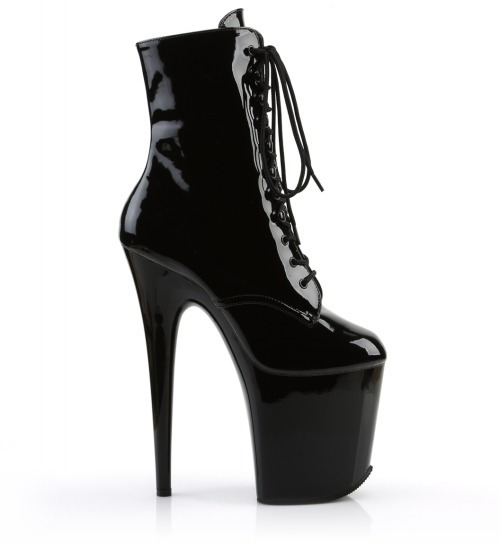
Last but definitely not least, Pleaser Flamingo-1020 black vinyl platform lace-up ankle boots completed the look.
#October 2023#jackets#pants#denim#sunglasses#bags#Celine#jumpsuits#Wolford#jewelry#Britt Bolton#Rainbow K#boots#Pleaser
7 notes
·
View notes